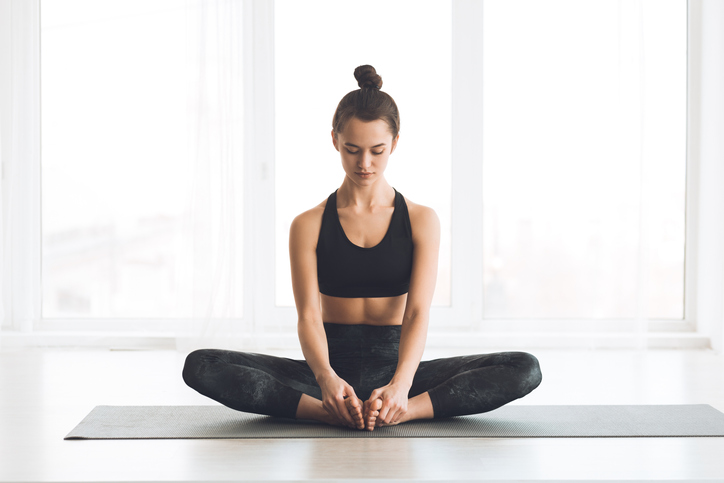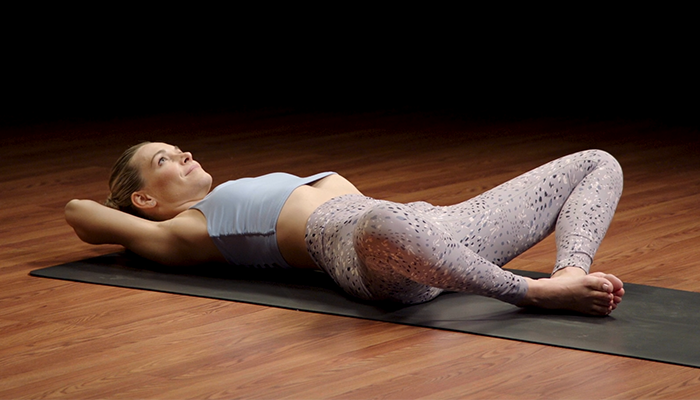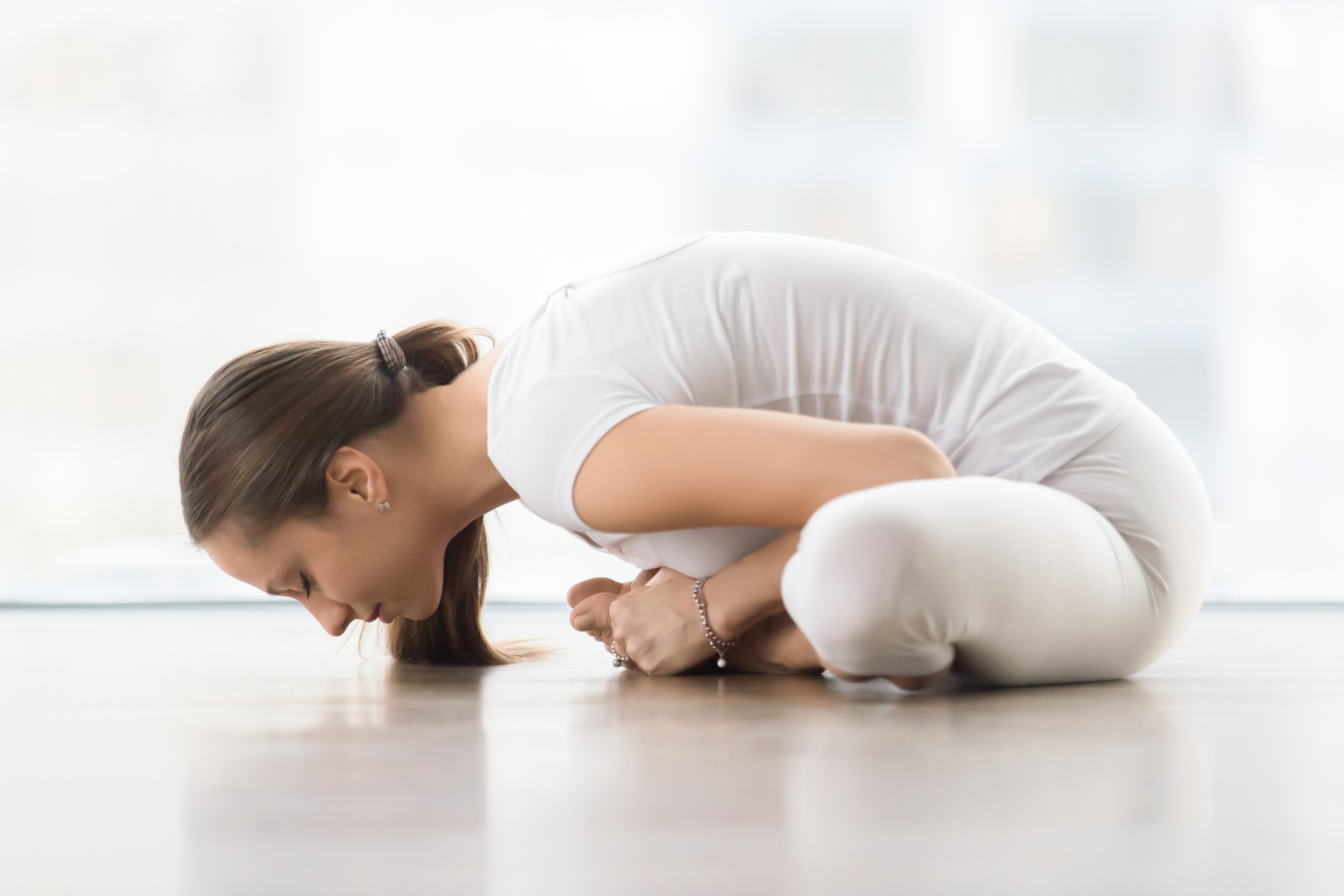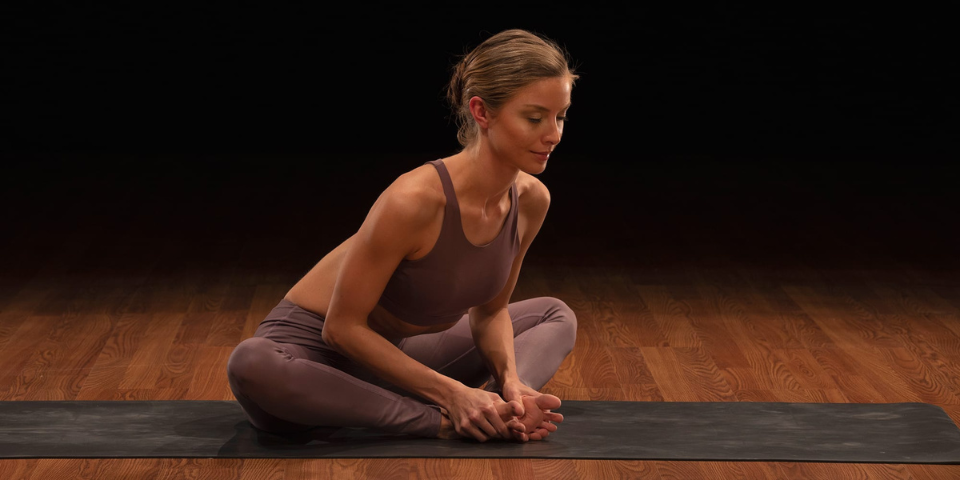Baddha konasana wins the prize for many aliases. Its widespread title is bound-angle pose, however it’s also called butterfly pose, cobbler’s pose, and even soles pose, relying on the kind of yoga you observe.
The direct translation from Sanskrit is bound-angle pose (baddha = certain, kona = angle, asana = posture/seat), and it will get that title as a result of the soles of the ft contact whereas the legs bend at an angle. When you’re on this pose, you’ll discover your bent legs additionally resemble butterfly wings.
At first look, bound-angle pose looks as if a fast method to separate the stiff from the flexible; getting the knees down and the hips open is a problem in the event you’re muscular or tight.
To not fear — there are many methods to switch this pose whether or not you’re a brand new or seasoned yogi.
Sure-Angle Pose (Baddha Konasana): Step-by-Step Directions

- Sit on the ground together with your butt bones instantly beneath you. (This retains you from tucking your tailbone.)
- Carry the soles of your ft collectively, letting your knees fall to the edges. The outer edges of your ft ought to contact.
- Draw your heels as near your groin as is comfy.
- Place your thumbs on the balls of your ft, and wrap the remainder of your fingers across the tops of your toes, as if holding an open ebook.
- Sit up as tall as you possibly can, hold your gaze ahead and your chest open, and maintain for not less than 5 breaths, as much as one minute.
Learn how to Make Sure-Angle Pose Simpler

Baddha konasana opens the hips and interior thighs, however it may well come at a steep worth for the knees. Right here’s the way to make butterfly pose simpler, to spare your knees undue pressure.
- Place blocks or bolsters beneath your knees. In case you have any earlier groin or knee accidents, it’s much more crucial to assist your knees.
- In case your knees fall above your hip bones on this pose, sit on a folded blanket to raise your hips or transfer your ft farther away out of your groin.
- For a extra restorative model, take supta baddha konasana (supta = reclined). Relaxation your higher again on a bolster, together with your arms prolonged out to your sides like a T. Place blocks beneath every knee so you possibly can totally chill out.
Learn how to Make Sure-Angle Tougher

There are many methods to deepen this pose, however be aware of your knees. In the event that they begin to really feel any pressure, take a much less intense model of bound-angle pose as a substitute.
Right here’s the way to make baddha konasana more difficult.
- Transfer your ft nearer to your groin (being aware to not spherical your backbone or tuck your tailbone).
- Sustaining a tall backbone, fold ahead with out rounding your again or letting your knees roll ahead. You need the motion to come back out of your hips.
- For a deeper stretch, press your elbows into your interior thighs, particularly as you fold ahead.
- Do this ashtanga model to stretch the again: Begin in butterfly pose, then tuck your chin to your chest on an exhale. Together with your decrease stomach engaged, spherical your again and purpose the crown of your head towards the arches of your ft. In case you are versatile sufficient to get there, you’ll discover your head has the proper place to relaxation!
Bonus/Newbie’s Suggestions for Doing Sure-Angle Pose
It bears repeating: You must by no means really feel baddha konasana in your knees. Novices are likely to mistake the “objective” of bound-angle pose with touching their knees to the ground.
In reality, butterfly is a hip opener that works on selling exterior rotation of the thigh bones within the hip sockets. Listed below are another suggestions for stepping into bound-angle pose.
- If you start to fold ahead, gauge whether or not you’re placing undue weight onto your knees and legs. If that’s the case, you’re doubtless arching your again to compensate for a scarcity of hip mobility.
- Hold your backbone lengthy all the best way all the way down to get essentially the most from baddha konasana. “The fold ahead in bound-angle pose is commonly mistaken for an excuse to examine your pedicure,” says Stephanie Saunders, BODi vp of health programming and a licensed yoga teacher. “If you happen to deal with bringing your stomach button — as a substitute of your nostril — to your ft, you’ll create extension by means of the backbone and really feel the stretch in your interior thighs and groin.”
- If you happen to’re a runner, a bicycle owner, or are muscular and tight, butterfly pose could also be difficult. Use as many props as you want — lifting your hips at the same time as a lot as 12 inches — to get comfy.
- Altering the angle doesn’t simply alter the depth — it alters the place you’re feeling the pose, too. “Sure-angle pose can change your focus, relying on the angles you’re creating,” says Saunders. “An extended angle created by the knees will lengthen totally different adductors farther than a shorter one, and also will trigger totally different exterior rotators to work. So combine up how shut your get your ft to your groin, to get all the advantages of this pose.”
- Don’t ignore the cue to “open your ft like a ebook” — it may well assist your knees. “Typically yogis really feel pressure of their knees in baddha konasana, which is widespread when the soles of their ft are turned towards the ceiling,” says Saunders. “One method to ease the pressure is to push the outer edges of your ft into the mat, which may also help stabilize the lateral ligaments of the knees.”
Advantages of Sure-Angle Pose
Baddha konasana affords an array of benefits for the decrease physique and backbone.
Opens the hips and interior thighs
Sure-angle pose stretches the hips, interior thighs, and groin, together with the adductors and the sartorius (the longest muscle in your physique, it helps to flex and rotate your thigh at your hip).
Baddha konasana helps to enhance the exterior rotation of your hips, and, while you fold ahead, stretches your abductors, together with the glutes and tensor fasciae latae.
Lengthens the backbone
Whereas we principally consider it as a lower-body pose, baddha konasana additionally helps promote higher posture by lengthening your backbone and the muscle mass that assist it.




